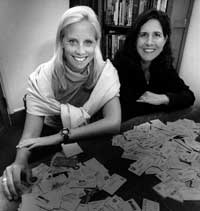|
HOME SEARCH ARCHIVE |
|
Government relations brings legislators to Berkeley, campus concerns to Sacramento and D.C.
By Cathy Cockrell, Public Affairs
| |
 Laura Capps (left) and Michelle Barer Moskowitz, who lead Berkeley's government relations efforts, display a large collection of business cards from their contacts in government. |
The four-day extravaganza included a reunion for staff who had served the Clinton-Gore Administration (she's a former assistant to George Stephanopoulos and a former speechwriter for Bill Clinton); a tribute to her father, the late Congressman Walter Capps (part of a slideshow dedicated to recently-deceased Democratic politicians); speechwriting for her mother, Congresswoman Lois Capps (D-Santa Barbara), who addressed the convention on health care issues; as well as a unique opportunity to touch base with dozens of state and federal legislators whose decisions hit close to home.
"Many of the state and federal legislators I'm trying to contact on a daily basis were there in the same place at the same time," says Capps, whose role on campus is "a lot about connections."
As the campus's link to state and federal government, the government relations program in the Office of Public Affairs facilitates contact between campus programs and those in government who fund them.
"State and federal funding... has a lot to do with how proactive and aggressive the campus is," Capps says. "We're gearing up now to make sure that we fight for good funding for the campus in next year's state budget. That takes getting in there early and working within the system to build support."
Faculty leaders approach the government relations office seeking all manner of assistance - from strategies for getting a bill passed to help in locating a Berkeley banner for a booth at a national science fair.
Other requests come from government. Last year, government relations staff helped showcase Berkeley's K-12 outreach programs for state and federal officials, including U.S. Secretary of Education Richard Riley.
"There was a big interest from federal and state legislators wanting to see what we're doing with K-12 outreach," recalls Michelle Barer Moskowitz, a former senior policy analyst at the Academic Senate and now associate director of government relations. "Riley was touting us. Berkeley got national attention from that, and then members of Congress wanted to see what we were doing."
Government relations, in conjunction with UC Office of the President, helped pass Proposition 1A, the largest school bond in California history. And it worked with the Federal Emergency Management Agency to secure major funding for the campus's seismic retrofit program - which remains high on government relations's agenda for the coming year, according to Capps.
Last spring, after learning that UC chancellors were scheduled to hold their annual meeting in Washington, D.C., Capps set up a West Wing briefing with White House Chief of Staff John Podesta. (See sidebar for Capps' comments on how the TV series "West Wing" compares with the real thing.)
"The chancellors asked a lot of questions," Capps says of the meeting. "Chancellor Berdahl asked about FEMA regulations that would be a detriment (to the SAFER program). Podesta was interested in the challenges that campuses face."
The office also is also keenly interested in bringing legislators to campus in order to showcase Berkeley programs and its use of public funds.
"One of our goals is to educate legislators about what we're doing on this campus," says Moskowitz.... "Every legislator who comes can do a custom tour of the campus and of the research, faculty, students and programs they're interested in."
Some legislators and legislative aides "like to sit in on a class or give a guest lecture," notes Capps. "A lot are former teachers; we set up meetings with the Berkeley Pledge."
Aides to East Bay Congresswoman Barbara Lee heard a concert by local high school students in the Young Musicians Program.
"Barbara Lee is very interested in what we're doing to help students in her district," says Moskowitz.
Congresswoman Zoe Lofgren (D-San Jose) who sits on the House Science Committee, is scheduled to visit Berkeley's Space Sciences Laboratory next month.
"She's never been there," Capps says. "The lab relies heavily on funding from NASA.... Lofgren has a lot to say about funding we get for space sciences projects."
Former White House staffer reviews 'West Wing'
Director of Government Relations Laura Capps served as a member of the White House Staff from 1995 to 1998 - beginning as executive assistant to President Clinton's senior adviser, George Stephanopoulos, and then as a presidential speechwriter.
Because of her personal experience in the West Wing, she at one point wrote on-line reviews of the TV series of the same name.
"I watched the first eight episodes religiously," Capps says. "I was predisposed to dislike the show. I pointed out all the flaws. Cosmetic stuff: the Roosevelt Room was wrong. The set is way too big. All those extra windows. The White House is much more quaint."
But the Oval Office "looks identical," she said. And beneath the surface, she finds the show "surprisingly realistic. There are huge things that aren't. Like the fact that the same five people do everything for the president; it's more like 45. But they have to develop characters.
"The show's strength," Capps says, "is that the characters are fairly realistic. You see good people working hard, being idealistic. That's not too far off. I had a good experience in government."
[HOME] [SEARCH] [ARCHIVE] [ABOUT] [CONTACT] [MORE NEWS]
Copyright 2000, The Regents of the University of California.
Produced and maintained by the Office of Public Affairs at UC Berkeley.
Comments? E-mail berkeleyan@pa.urel.berkeley.edu.